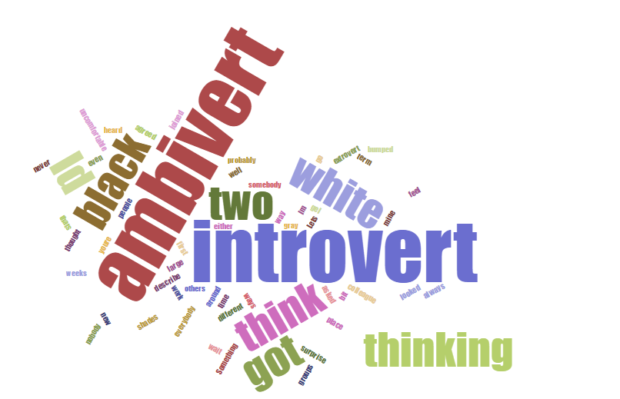Now Is The Time For You To Know The Truth About Ambiverts

The following is a guest post by Parvathy. Bio follows.
Black can never be white, can it? Something can either be black or white. There are no two ways about it. Or wait, is there?
Where did the shades of gray go? Let’s think about this.
When somebody asked me to describe myself, I said I’m an introvert. This was after I had joined a new place of work and had been around for two weeks. To my surprise, nobody agreed! “You gel well with everybody, how can you even think you’re an introvert?” is what a colleague of mine said. That got me thinking. I’d always thought I am an introvert because I feel a bit uncomfortable with large groups of people, but the way others looked at me was different.
So, could I be both an introvert and an extrovert? It got me thinking, and that’s when I bumped into a term I’d probably heard for the first time – ambivert.
Introverts are the ones who draw energy internally, that is, from themselves and people very close to them, while extroverts draw energy from external sources, from a large gathering or crowd. Here’s it’s important to understand that personality forms much early, during childhood and it gets shaped further during adolescence.
If you’re someone who’s been unable to identify what personality type you fall into, you’ll be surprised that you could very well be an ambivert.
Who are ambiverts?
Ambiverts are both introverts and extroverts, that is, they live on the middle ground! They have a balance of the characteristics of both these extreme personality types. Now, according to both Jung’s Theory and the Myers-Briggs Theory, there are only two categories, even though Jung had proposed a third type, which he didn’t talk much about. This third type is the ambivert. If you feel that there aren’t too many people of this type, or you’re one of a kind, then here’s something – 38% of us are ambiverts! While talking about personalities, experts had ignored this very important type, also known as the lost personality type.
The degree of being an ambivert may vary. You might find that you’re an extroverted ambivert, while others might lean more towards being an introverted ambivert. But the bottom line is, they are not on either end of the pole.

Here are a few things you should know about ambiverts.
1. They don’t have split personality
Just because they’re both introverts and extroverts, it doesn’t mean that they have a split personality. What part of their personality they show depends a lot on people around them and the situation in which they’re in.
2. Individual, or groups, they like both
Ambiverts can gel well with individuals and talk for hours, but that doesn’t mean they’re uncomfortable when they are in large groups. The catch, however, is, they get tired after spending a long time in groups.
3. Alone time? Yes. Alone time? No!
This can be confusing to most people, especially if they are not ambiverts. For example, I like my fair share of alone time, but if left alone for a very long time, I feel depressed, even annoyed. As a matter-of-fact, ambiverts like some time to themselves, but not long.
4. Conversations in private
Ambiverts love conversations with intimate groups, but can very often be found to be quiet when in large groups. They can go non-stop with people they are close to, but in groups, they choose to find like-minded people and mingle with them.
So, is being an ambivert a good thing? Let’s find out.
Ambiverts are known as the ‘flexible’ personality. They can adapt very well to situations. They can relate to both introverts and extroverts as they have traits of both types. These people are the most preferred kind of employee because almost no situation can put them off. They can work both individually and in teams, which makes them an ideal recruit.
On the flip side, ambiverts can be confused about themselves. They might not know how to react to situations, considering that they’re a bit of both. Apart from that, different people look at them in different shades of light. While many would call them introverts and avoid them, others would love to gel with them extroverts.
So, if you are an ambivert or you are dealing with a person who is one, don’t label them as inconsistent. They react differently to different set-ups, and that’s a part of their/your personality trait! The key is not to mold your behavior just because you belong to a specific personality type!
About the author
I’m Parvathy and I’m best described as an observer and thinker. I’m a blogger (http://parvathyspeaks.
.
Image credit: scale.




